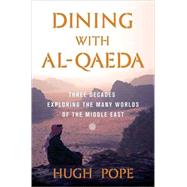
| Map Of The Middle East | p. x |
| Prologue | p. xiii |
| Mr. Q, I Love You | |
| Oriental Studies Meets the Middle East | p. 1 |
| It's A Fine Line | |
| Journalism on the Road from Damascus | p. 11 |
| The Plot In the Conspiracy | |
| Spies in the Syria-Lebanon-Palestine Triangle | p. 28 |
| Hunting For Scapegoats | |
| Foreign Interference and Misrule in Lebanon | p. 38 |
| A Pilgrimage to Jerusalem | |
| The Israel-Palestine Entanglement | p. 49 |
| The Drunken Lover | |
| Revolutionary Iran's Struggle With Its Poetic Soul | p. 68 |
| Subversion in the Harem | |
| Women on the Rise, from Cairo to Istanbul | p. 84 |
| War, War to Victory | |
| Iran's School of Martyrdom and Love | p. 99 |
| Mammon in Mecca | |
| Crushing Religious Diversity in the Name of Islam | p. 117 |
| Dining With Al-Qaeda | |
| A Saudi Missionary and the "Wonderful Boys" of September 11 | p. 132 |
| Tea With the Brigadier | |
| Failing the Famished of South Sudan | p. 156 |
| The Central Bank Governor Has no Socks | |
| Taliban Warlords, Pakistani Feudals, and the Nation-State | p. 170 |
| Regal Republics, Democratic Kings | |
| Syria, Jordan, and the Dimensions of Dictatorship | p. 196 |
| Saddamized | |
| Inside Iraq's Psychotic Stress Machine | p. 218 |
| Jousting With the Juggernaut | |
| How Not to Stop a U.S. Invasion | p. 232 |
| Stop Firing! This is a Military Situation | |
| One Step Behind the War with the Kurds | p. 249 |
| The Yezidi Heresy | |
| An Alternative Approach to Military Liberation | p. 272 |
| The General and the Professor | |
| America Collides with History in Iraq | p. 287 |
| Epilogue | p. 303 |
| Acknowledgments | p. 311 |
| Index | p. 313 |
| Table of Contents provided by Ingram. All Rights Reserved. |
The New copy of this book will include any supplemental materials advertised. Please check the title of the book to determine if it should include any access cards, study guides, lab manuals, CDs, etc.
The Used, Rental and eBook copies of this book are not guaranteed to include any supplemental materials. Typically, only the book itself is included. This is true even if the title states it includes any access cards, study guides, lab manuals, CDs, etc.